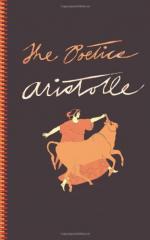
|
| Name: _________________________ | Period: ___________________ |
This quiz consists of 5 multiple choice and 5 short answer questions through Section II.
Multiple Choice Questions
1. What does Aristotle say about the element of surprise in a tragedy?
(a) It helps inspire sadness.
(b) It helps inspire pity.
(c) It keeps the reader guessing and interested.
(d) It helps inspire joy.
2. Why does Aristotle say that Homer's "Iliad" is not a tragedy?
(a) It has too many episodes and sub-stories to fit the format.
(b) It lacks irony.
(c) It is a happy story.
(d) The reader feels no pity.
3. What does Aristotle identify as the most essential element of tragedy?
(a) Rhyme.
(b) Irony.
(c) Character.
(d) Plot.
4. Based on Aristotle's teachings, why do some tragedies use certain effects when performed on stage?
(a) To impress their spectators.
(b) Because they are "silent" tragedies.
(c) To justify higher ticket prices.
(d) To express language visually.
5. What type of tragedy does Aristotle say does NOT require impressive visual effects when performed on stage to impress their spectators?
(a) A complex tragedy.
(b) An unusual tragedy.
(c) A superior tragedy with a strong plot.
(d) An episodic tragedy.
Short Answer Questions
1. The plot, as Aristotle explains, should be unified in such a way that each part should be what?
2. Artistically, what type of recognition does Aristotle consider to be a serious flaw?
3. Concerning the "laws of probability and necessity," what statement below is NOT correct according to Aristotle's teachings in "Poetics"?
4. As Aristotle explains, when an evil main character of a tragic story experiences misfortune, why doesn't this inspire certain key emotions in the audience?
5. According to Aristotle, what happens in a legitimate tragedy?
|
This section contains 356 words (approx. 2 pages at 300 words per page) |

|




